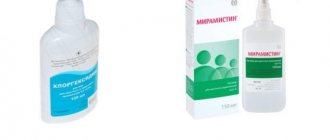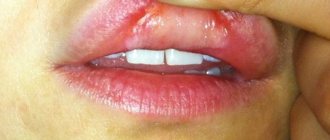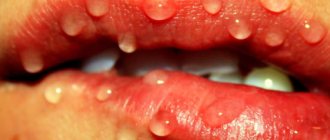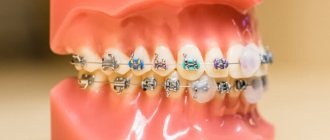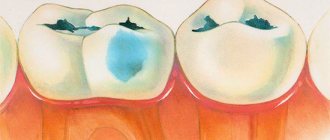The smell of ammonia from the mouth is a specific manifestation of gastroenterological pathologies, which has no restrictions regarding a person’s gender and age category. However, not only diseases of the gastrointestinal tract can cause such an unusual manifestation. The reasons may be dental problems and several completely harmless factors.
- Etiology
- Symptoms
- Diagnostics
- Treatment
- Prevention
Along with a specific odor, a large number of other clinical signs may appear, and they may differ in adults and children.
The cause of this symptom can only be determined through some laboratory and instrumental examinations of the patient. Treatment involves the use of only conservative techniques.
Etiology
The causes of ammonia odor from the mouth may be due to the following factors:
- diabetes;
- renal failure;
- uncontrolled use of medications, especially those containing large amounts of amino acids and nitrogen;
- poor nutrition – this includes long intervals between food intakes or prolonged refusal to eat;
- specific dietary nutrition, in which the basis of the diet is proteins. People who decide to stick to a low- or no-carbohydrate menu need to be prepared for the smell of ammonia in their mouth;
- endocrine pathologies, namely a disease such as thyrotoxicosis. This is a specific disease of the thyroid gland in which there is a high level of thyroid hormone. This substance is responsible for metabolism, and its increased concentration leads to the fact that metabolism accelerates several times. In this case, a sharp decrease in body weight occurs, despite the fact that the person eats normally;
- helminthic infestation;
- ulcer of the duodenum or stomach;
- hyperglycemic state;
- acetonemic syndrome;
- diseases of the genitourinary system;
- pancreatitis or cholecystitis;
- presence of intestinal infections;
- hepatitis;
- some dental disorders, particularly caries, stomatitis and periodontitis;
- intestinal dysbiosis;
- diseases of the ENT organs, in particular sinusitis, tonsillitis, tonsillitis, sinusitis, and adenoiditis.
Intestinal dysbiosis is a possible cause of ammonia odor from the mouth
In addition to the above predisposing factors, a child may experience a similar manifestation against the background of:
- poor nutrition, which does not correspond to the age category of the baby;
- reluctance to brush teeth;
- helitophobia – this condition can be attributed to adolescents. It consists of an imaginary smell of ammonia while breathing, while parents and doctors claim that there is no ammonia. In such cases, psychological help or consultation with a psychiatrist is necessary.
Ways to eliminate ammonia bad breath
In order to eliminate ammonia odor from the mouth, it is necessary to carry out complex treatment. To combat pathology, drugs and traditional medicine are used. Additionally, patients are advised to adhere to a certain diet.
The selection of medications in each specific case will depend on the disease that caused the bad breath. The problem can also be caused by taking certain groups of medications. In this case, the bad breath will disappear after stopping the course of the drug. If the time of occurrence of halitosis coincides with the start of therapy, then, most likely, bad breath is associated specifically with drug treatment.
List of drugs that may cause an ammonia smell from the mouth:
- ACTI-5. Prescribed to stimulate appetite in children.
- Glycine. Used to reduce the symptoms of neurological problems manifested by restless sleep and inability to control emotions.
- Methionine. The drug is prescribed for diseases of the liver and bile ducts.
When haliosis occurs, special emphasis is also placed on nutrition. A carbohydrate-free protein diet leads to increased stress on the urinary organs. As a result, a bad odor appears from the oral cavity. If there is a suspicion that the causes of the problem are related to nutrition, then the diet is corrected. The menu includes fresh vegetables and fruits, cereals, and vegetarian soups. With normalization of nutrition, bad breath disappears within 3-4 days.
Along with etiological therapy, symptomatic control of pathology is also carried out. To minimize the unpleasant symptom, various aerosols and sprays that freshen breath are used. Such funds include:
- Hexoral, produced in the form of an aerosol and solution. They rinse the mouth with it 2 times a day, without diluting with water. The duration of the procedure is 30-40 seconds. The aerosol is sprayed into the oral cavity twice a day. The medication is contraindicated in children under 3 years of age and in patients with intolerance to the components of the drug.
- Stopangin, produced in the form of a spray and solution. Use after meals no more than 2 times a day, regardless of the form of release. The medicine is contraindicated in preschool children and people with pharyngitis.
- Chlorhexidine. The solution is used to treat the oral cavity in a crushed form (as indicated in the instructions). The drug is prescribed to children with caution.
Signs of halitosis can also be effectively relieved with the help of alternative medicine. There are several recipes used to combat bad breath:
- Alcohol tincture of St. John's wort: several tbsp. l. dry raw materials are poured with ½ glass of vodka and left in a dark place for 24 hours. The strained broth is mixed with warm water in a ratio of 30 drops per 200 ml, respectively. Rinse your mouth with the product 2-3 times a day after meals.
- Strawberry tincture: 2 tbsp. l. leaves of the plant are boiled in 0.5 liters. water and drink 100 ml before meals.
- Oxalis solution: 2-3 tbsp. l. crushed raw materials are brewed in 0.5 liters of boiling water. The product is infused for several hours and used to rinse the mouth 2-3 times a day. Oxalis is famous for its powerful antiseptic and anti-inflammatory effects.
- Cranberry juice. The drink eliminates bad breath and effectively fights urolithiasis. To prepare the product, take 500 g of berries and squeeze the juice out of them. The cake is transferred to a saucepan and filled with 500 ml of water. The drink is boiled for 3-5 minutes, then drunk in unlimited quantities. To improve the taste of the drink, you can add honey (not sugar).
DETAILS: Treatment of gums for periodontitis with folk remedies
To eliminate ammonia breath, it is also recommended to drink as much clean water as possible. You need to consume at least 2 liters of fluid per day for an adult and 1.5 liters for a child
Symptoms
If your breath constantly smells of ammonia, then this is due to the presence of one or another pathological process. It follows from this that, along with the main clinical manifestation, the following may be observed:
- constant feeling of thirst;
- dry mouth;
- frequent urge to urinate;
- headaches and dizziness;
- bowel disorders;
- blood pressure fluctuations;
- absent-mindedness and lethargy;
- depression and apathy;
- weight loss;
- pain of varying degrees of intensity in the abdominal area or in the area of the affected organ, for example, the liver or kidneys;
- bloating;
- increased gas formation and sweating;
- yellowness of the skin and sclera;
- darkening of urine and discoloration of feces;
- disturbance of consciousness.
The smell of ammonia from a child’s mouth may be accompanied by:
- foul odor emanating from the skin;
- attacks of nausea and vomiting;
- constipation;
- cramping pain in the abdomen;
- arrhythmia or tachycardia;
- decreased or complete lack of appetite;
- increase in body temperature;
- pale skin;
- signs of intoxication;
- sleep disorders;
- decreased mental and physical activity.
The occurrence of the main clinical sign in combination with additional symptoms is a reason to immediately seek qualified help.
Diagnostics
In order to independently identify the presence of ammonia breath, there are several diagnostic methods.
Determining the presence of such a specific odor at home involves performing one of several simple tests:
- Place a cotton pad or paper napkin under the tongue. After about ten seconds, it is taken out and the aroma is assessed;
- sniff the dental floss or toothpick a few minutes after use;
- lick the skin on your wrist and after a couple of seconds smell this area;
- clasp your palms, cover your mouth with them, exhale air through your mouth and inhale through your nasal cavity;
- A variation of the previous technique is to use an empty glass instead of your palms, into which you need to exhale deeply several times and then sniff the air in the glass.
However, the most proven way to determine whether your breath smells of ammonia is to visit a dentist, who will use a special apparatus to measure the level of hydrogen sulfide released.
Establishing the causes of the appearance of such a symptom in a medical institution includes:
- clarification of complaints, medical history and life of the patient;
- performing an objective examination;
- laboratory studies of blood, urine and feces;
- X-ray and ultrasound of the abdominal organs;
- gastroscopy and FEGDS;
- MRI and CT;
- consultations with an ENT doctor, dentist, endocrinologist and psychiatrist.
Gastroscopy procedure
Various laboratory and instrumental examination methods can be prescribed individually for each patient.
Treatment
Symptomatic therapy includes:
- use of medicines;
- change in diet;
- physiotherapeutic procedures;
- use of traditional medicine recipes.
Drug treatment includes the use of:
- anti-inflammatory drugs;
- solutions and aerosols, the action of which is aimed at suppressing the growth of pathogenic microorganisms.
Good results in eliminating ammonia odor from the mouth of adults and children can be achieved by using the following medicinal herbs and natural ingredients:
- coffee beans and cumin - must be chewed thoroughly and then spat;
- apple – eaten raw;
- St. John's wort and strawberries;
- mint and chamomile;
- calendula and lemon balm;
- rose hips and cranberries;
- sage and fennel;
- oak bark and propolis;
- thyme and ginger root.
Other treatment methods will differ depending on what was the etiological factor in the occurrence of such a specific symptom.
Treatment options
Medications
Therapy includes:
- Use of Stopangin, which produces an antibacterial and antifungal effect (two daily rinses before meals). Contraindications include atrophic pharyngitis, pregnancy, and age under six years.
- The use of Chlorhexidine, characterized by a bactericidal and antiseptic effect. Chlorhexidine is not used for itching, allergies, or dermatitis.
- Use of Hexoral, which suppresses bacterial proliferation (twice daily). Contraindications: allergies, age less than 3 years.
- The use of anti-inflammatory, diuretic, hormonal, antibiotic drugs, mineral and vitamin complexes.
- Organization of measures to normalize blood sugar levels (if permissible levels are exceeded).
Folk remedies
In consultation with a medical specialist, products based on medicinal plants are used.
To rinse with St. John's wort tincture (twice a day after meals or more often), 15 drops of St. John's wort tincture are diluted in half a glass of warm water.
To eliminate unpleasant odor, use St. John's wort tincture
Dry sorrel (three tablespoons) is poured into 0.5 liters of boiling water, infused for two hours, filtered, and used for rinsing.
Dry strawberry leaves (1 tablespoon) are boiled in 2 glasses of water, the decoction is consumed several times a day.
Do you feel nervous before visiting the dentist?
Not really
Chewing gum, which eliminates bad odor, is prepared from melted beeswax, a few drops of tea tree (or mint) essential oil, lemon juice, and honey. The mixed ingredients are rolled into balls.
Wormwood, yarrow, tansy, after mixing in any proportions (total volume - one tablespoon), are brewed in a glass of boiling water. After 15 minutes of infusion and straining, rinse the mouth three times a day.
It is necessary to rinse the mouth with herbal decoctions three times a day.
Olive oil is also used for rinsing in the amount of one dessert spoon (duration – 5-6 minutes).
Diet therapy
Diet therapy involves eating foods that increase salivation: apples, other fruits, homemade yogurt, green tea. In order to prevent the proliferation of pathogenic microorganisms, the consumption of cheese, fermented milk products, and foods high in protein should be minimized.
Prevention
The following simple rules will help prevent the smell of ammonia:
- regular and full compliance with the rules of oral hygiene;
- proper and nutritious nutrition;
- timely treatment of gastroenterological diseases and other ailments that can cause ammonia odor from the mouth;
- complete cessation of bad habits;
- plenty of drinking regime;
- annual preventive medical examination.
Timely self-identification of such a symptom and seeking qualified help guarantees getting rid of such an unpleasant symptom and a complete recovery. Otherwise, the patient’s quality of life may decrease and complications of the disease may develop, causing the smell of ammonia to appear in the mouth.
Diagnosis
You can eliminate bad breath only by understanding the nature of its origin. To this end, you should undergo a series of studies:
- Donate blood for sugar.
- Test your urine and blood for the presence of ketone.
- Check urine for the presence of kidney pathologies.
- Determine hormonal levels.
- Examine internal organs (ultrasound).
- And the final stage will be consultation with a specialist.
